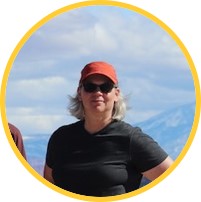Wind climatology at the Rosemount, MN wind energy research field site
Dr. Katherine Klink, Associate Professor, Department of Geography, Environment, and Society, University of Minnesota
The Eolos Wind Research Station in Rosemount, Minnesota, was established in 2011 to support basic research and development of new technologies for wind energy generation. The site includes a 2.5 MW utility-scale wind turbine (80 m hub height) and a 130m meteorological (met) tower. The met tower is instrumented with sonic anemometers at approximately 10, 30, 80, and 128 m AGL. We use six years (2012-2017) of hourly data from the met tower to investigate wind speed, shear, and turbulence characteristics across the rotor swept area at diurnal and seasonal time scales, as well as their relationship to broader synoptic patterns. The synoptic-scale weather conditions that promote faster and slower wind speeds are well recognized, but it is less clear how the rotor-area wind profile varies under those same synoptic conditions.
We examine wind speed, turbulence intensity, turbulence kinetic energy, speed shear and direction veer across the rotor and relate them to synoptic-scale patterns via clustering experiments using the MERRA-2 reanalysis. Fifteen clusters (synoptic types) provided the best combination of explained variance of the wind variables and separability between clusters. We find that the rotor-area characteristics of the 15 synoptic types can account for about 42% of the variance in monthly turbine power output. Our regression model has better predictability when using the observed data (explained variance of about 60% vs 42%), but in the absence of direct observations, the synoptic types can provide some insight about expected variation in power that may be gleaned from extended-range weather forecasts or projections of future climate change.
We thank Chris Milliren, St. Anthony Falls Laboratory, for providing the Eolos met tower data set.

Dr. Katherine Klink has long had an interest in weather and climate, related to growing up on a dairy farm in southeastern Wisconsin. She completed a BS in Atmospheric Science in 1982 at the University of Wisconsin-Milwaukee. In addition to meteorology she took some climatology and physical geography courses offered by the Geography Department. Those classes piqued her interest in geography, especially Donn Haglund's Arctic Winter Field Course, which that year took her to Greenland and Iceland. She decided to do graduate work in a Geography department, opting to pursue climatology rather than meteorology. She completed a graduate work in the Geography Department at the University of Delaware, receiving an M.S. in Geography in 1987 and a Ph.D. in Climatology in 1992. She joined the faculty at the University of Minnesota in January 1992.
